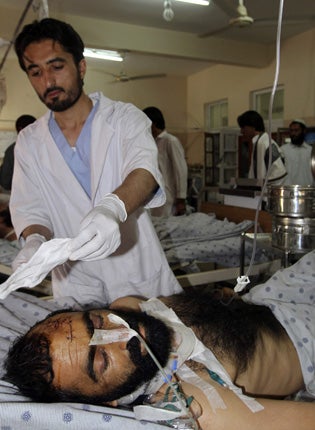UN scales back after three bomb blasts rock Kandahar City ahead of key Nato campaign

Your support helps us to tell the story
From reproductive rights to climate change to Big Tech, The Independent is on the ground when the story is developing. Whether it's investigating the financials of Elon Musk's pro-Trump PAC or producing our latest documentary, 'The A Word', which shines a light on the American women fighting for reproductive rights, we know how important it is to parse out the facts from the messaging.
At such a critical moment in US history, we need reporters on the ground. Your donation allows us to keep sending journalists to speak to both sides of the story.
The Independent is trusted by Americans across the entire political spectrum. And unlike many other quality news outlets, we choose not to lock Americans out of our reporting and analysis with paywalls. We believe quality journalism should be available to everyone, paid for by those who can afford it.
Your support makes all the difference.in the latest sign that Kandahar City is sliding deeper into violence ahead of a massive Nato campaign there, the UN yesterday announced it was scaling back its operations hours after three bomb blasts rocked the city.
Two of the attacks seemed to target the deputy provincial police chief, Fazel Ahmad Sherzad, detonating within a minute of each other in downtown Kandahar as a convoy carrying Mr Sherzad passed by. "They were targeting the car I normally use, but luckily I was not in it at the time," he said.
Two hours later a third bomb exploded in the city's northern quarter. Two civilians were killed in the blasts, which followed the murder of Haji Abdul Hay, a tribal elder and the brother of a former senator.
The wave of attacks suggests the Taliban is making good on a promise to increase violence in the city in response to Nato's plans to restore Afghan sovereignty. In as much as it is controlled by anyone, Kandahar City is in the hands of a murky nexus of powerbrokers and mafiosi.
The violence prompted the UN to order 200 Afghan staff working in the city to stay at home. A spokesman conceded that "several" non-Afghans had been moved from the city to the capital, Kabul. "There is always a balance to be struck to ensure the safety of our staff and ensure that we can deliver our programmes and humanitarian assistance to the people of Afghanistan," Dan McNorton said.
"We constantly have to adapt our ways of working. We will continue to monitor the security situation in Kandahar and hope to be able to get back to work as soon as possible," he added.
The UN pulled many "non-essential" workers out of Afghanistan after a Taliban suicide squad attacked a Kabul guesthouse used by its staff last October. It denied the move was an evacuation.
Some of the half-million inhabitants of Kandahar, the birthplace of the Taliban, said they were increasingly scared. "The security in this city is deteriorating," Enayutullah Khan, a 43-year-old rickshaw driver, told the Associated Press. "People leave their homes only to find food for their children. Otherwise we don't leave the house."
Join our commenting forum
Join thought-provoking conversations, follow other Independent readers and see their replies
Comments